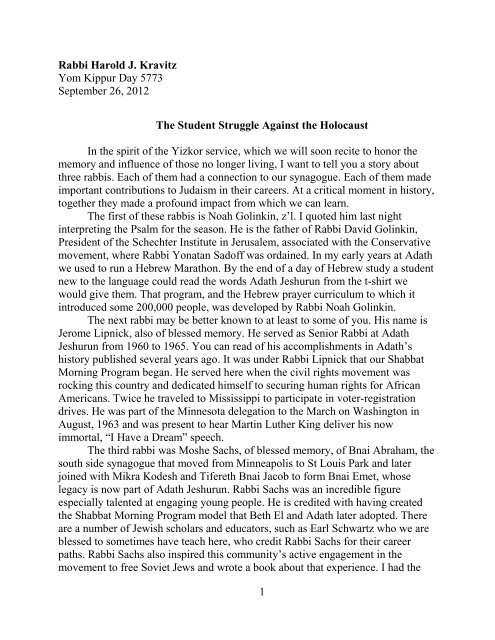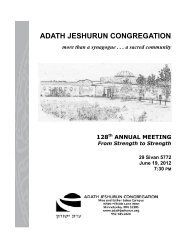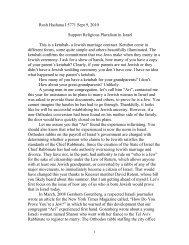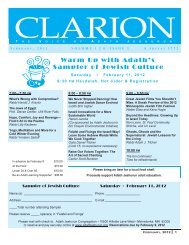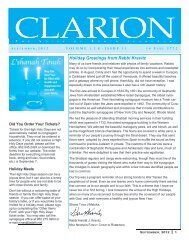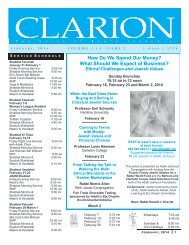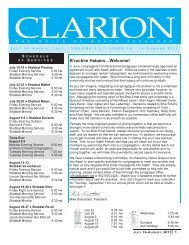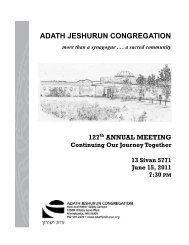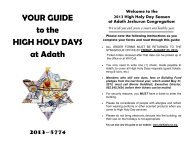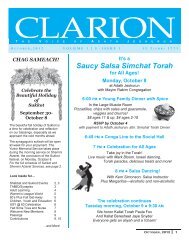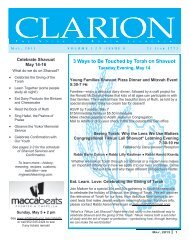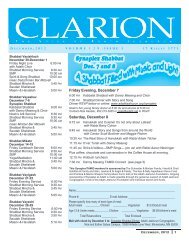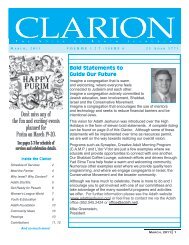Read Rabbi Kravitz's Yom Kippur sermon - Adath Jeshurun ...
Read Rabbi Kravitz's Yom Kippur sermon - Adath Jeshurun ...
Read Rabbi Kravitz's Yom Kippur sermon - Adath Jeshurun ...
You also want an ePaper? Increase the reach of your titles
YUMPU automatically turns print PDFs into web optimized ePapers that Google loves.
<strong>Rabbi</strong> Harold J. Kravitz<br />
<strong>Yom</strong> <strong>Kippur</strong> Day 5773<br />
September 26, 2012<br />
The Student Struggle Against the Holocaust<br />
In the spirit of the Yizkor service, which we will soon recite to honor the<br />
memory and influence of those no longer living, I want to tell you a story about<br />
three rabbis. Each of them had a connection to our synagogue. Each of them made<br />
important contributions to Judaism in their careers. At a critical moment in history,<br />
together they made a profound impact from which we can learn.<br />
The first of these rabbis is Noah Golinkin, z’l. I quoted him last night<br />
interpreting the Psalm for the season. He is the father of <strong>Rabbi</strong> David Golinkin,<br />
President of the Schechter Institute in Jerusalem, associated with the Conservative<br />
movement, where <strong>Rabbi</strong> Yonatan Sadoff was ordained. In my early years at <strong>Adath</strong><br />
we used to run a Hebrew Marathon. By the end of a day of Hebrew study a student<br />
new to the language could read the words <strong>Adath</strong> <strong>Jeshurun</strong> from the t-shirt we<br />
would give them. That program, and the Hebrew prayer curriculum to which it<br />
introduced some 200,000 people, was developed by <strong>Rabbi</strong> Noah Golinkin.<br />
The next rabbi may be better known to at least to some of you. His name is<br />
Jerome Lipnick, also of blessed memory. He served as Senior <strong>Rabbi</strong> at <strong>Adath</strong><br />
<strong>Jeshurun</strong> from 1960 to 1965. You can read of his accomplishments in <strong>Adath</strong>’s<br />
history published several years ago. It was under <strong>Rabbi</strong> Lipnick that our Shabbat<br />
Morning Program began. He served here when the civil rights movement was<br />
rocking this country and dedicated himself to securing human rights for African<br />
Americans. Twice he traveled to Mississippi to participate in voter-registration<br />
drives. He was part of the Minnesota delegation to the March on Washington in<br />
August, 1963 and was present to hear Martin Luther King deliver his now<br />
immortal, “I Have a Dream” speech.<br />
The third rabbi was Moshe Sachs, of blessed memory, of Bnai Abraham, the<br />
south side synagogue that moved from Minneapolis to St Louis Park and later<br />
joined with Mikra Kodesh and Tifereth Bnai Jacob to form Bnai Emet, whose<br />
legacy is now part of <strong>Adath</strong> <strong>Jeshurun</strong>. <strong>Rabbi</strong> Sachs was an incredible figure<br />
especially talented at engaging young people. He is credited with having created<br />
the Shabbat Morning Program model that Beth El and <strong>Adath</strong> later adopted. There<br />
are a number of Jewish scholars and educators, such as Earl Schwartz who we are<br />
blessed to sometimes have teach here, who credit <strong>Rabbi</strong> Sachs for their career<br />
paths. <strong>Rabbi</strong> Sachs also inspired this community’s active engagement in the<br />
movement to free Soviet Jews and wrote a book about that experience. I had the<br />
1
privilege of getting to know <strong>Rabbi</strong> Sachs in his retirement in Jerusalem. I had the<br />
special honor of visiting with him, at the invitation of his son Noam, shortly before<br />
his death in 2009. I had the opportunity to thank him for the incredible<br />
contributions he made in his years here.<br />
You may, or may not have heard of these rabbis, but there is a chapter from<br />
early in their lives that I want us to honor, acknowledge and learn from today. All<br />
three men attended rabbinical school at the Jewish Theological Seminary in New<br />
York, which has produced most of the clergy for our congregation. The three of<br />
them overlapped there in 1942. That summer, 70 years ago, Americans were<br />
hearing shocking reports from Europe about ongoing attacks against Jews at the<br />
hands of Nazi Germany. In June, 1942, Jews who had escaped reported that the<br />
Germans had begun to systematically exterminate Poland’s Jewish population, and<br />
had already murdered an estimated 700,000 Jews there.<br />
In August of 1942 a telegram was sent to <strong>Rabbi</strong> Stephen S. Wise, a major<br />
leader of the American Jewish community by Gerhart Riegner, who represented<br />
the World Jewish Congress in Europe. He reported that the Nazis had plans for the<br />
deportation and extermination of all Jews in countries occupied or controlled by<br />
Germany, numbering as many as 4million. Imagine trying to make sense of that.<br />
People here had difficulty believing that such an outrageous report could possibly<br />
be true.<br />
This telegram placed huge responsibility on the shoulders of <strong>Rabbi</strong> Wise.<br />
He was the preeminent Reform rabbi of his time, renowned for his work to<br />
establish a Jewish state in Palestine, despite the opposition of many in his<br />
movement at the time. <strong>Rabbi</strong> Wise was known to have had strong ties and some<br />
access to President Franklin D. Roosevelt.<br />
<strong>Rabbi</strong> Wise questioned the State Department about the horrendous reports<br />
coming from Europe, but was asked to withhold public comment until these claims<br />
could be properly investigated. It took until November, 1942 for the US State<br />
Dept. to confirm the accuracy of Riegner’s memo. Wise then moved quickly to<br />
publicize the terrifying reports about European Jewry that he was receiving.<br />
That fall, Noah Golinkin was in his first year of rabbinical school at JTS. He<br />
read of what was happening in Europe with particular horror. Born in Poland, he<br />
had only immigrated to the US in 1938. The papers were now reporting that the<br />
world in which he was raised was literally going up in smoke. With new friends<br />
made at JTS, Moshe “Buddy” Sachs and Jerry Lipnick, they resolved to do<br />
something to awaken the American Jewish Community to the nightmare unfolding<br />
in Europe. In the JTS dormitory in November 1942 they formed what they called<br />
the “European Committee of the Student Body of the Jewish Theological<br />
Seminary.” Even by the standards of the times this was not such a catchy name.<br />
2
The committee’s initial agenda was modest. In November and December<br />
they inserted a special prayer for Divine intercession on behalf of Europe’s Jews<br />
and recited extra chapters of Psalms in the campus Shabbat services. When major<br />
Jewish organizations proclaimed a community-wide day of fasting on December 2<br />
for Hitler’s Jewish victims, they recruited their fellow student’s participation and<br />
urged them to donate their meal money for overseas relief.<br />
The JTS students expected the confirmation of the mass killings of Jews in<br />
Europe to be met with a massive outpouring of protest by the American Jewish<br />
community. At first there was some movement in that direction. In addition to the<br />
national fast day, leaders of American Jewry arranged a Dec 8 th meeting with<br />
President Roosevelt, who appeared unmoved by their urgings.<br />
Seeing a lukewarm response, the young JTS students insisted on a meeting<br />
with <strong>Rabbi</strong> Wise, a pretty chutzpadik move. They were disheartened when <strong>Rabbi</strong><br />
Wise dismissed the idea that a safe haven be sought to which Jews could flee in as<br />
much as the British had blocked entry to Palestine to appease the Arabs. The<br />
threesome proposed that students be mobilized on college campuses around the<br />
country to sound the alarm on what was happening in Europe. Wise rejected that<br />
proposal as well counseling the young men to trust his judgment and be patient.<br />
In truth, Wise was working behind the scenes to get a joint statement of<br />
condemnation of Germany by the Allied nations. The very next day a weak<br />
statement of Allied nations was issued saying that the perpetrators of these<br />
atrocities would be punished after the war. The students felt like they had received<br />
two punches in the gut. First, they were shocked by the lack of responsiveness of<br />
<strong>Rabbi</strong> Wise. Secondly the Allied nations were saying that they would do nothing to<br />
stop the atrocity, only threatening to hold the Germans accountable when the war<br />
ended.<br />
The three young JTS students would not relent. They were determined to<br />
shatter the complacency of the leadership of the American Jewish community that<br />
was perhaps afraid to alienate President Roosevelt or even more afraid, in a far<br />
more anti-Semitic time in this country, that Jews would be attacked here for caring<br />
only about other Jews at the expense of the greater goal of winning the war.<br />
The challenges faced by these students in getting their message out were<br />
enormous. There was no internet. Material had to be printed and mailed. Yet these<br />
three rabbinical students organized a movement that had a significant impact in<br />
moving the hearts and minds of American Jewry to finally speak out aggressively,<br />
though belatedly, on behalf of their brethren in Europe.<br />
In February, 1943 they organized an Inter-Seminary Conference of the<br />
Plight of European Jewry with their neighboring, Protestant, Union Theological<br />
Seminary. Several hundred Jewish and Christian Seminarians joined together to<br />
3
hear the extent of the problem and commit themselves to action. They issued alerts<br />
to every synagogue in the country calling for prayer and action.<br />
In March of 1943 the trio jointly published an article in the Reconstructionist<br />
Magazine, which then had a wide readership among leaders of the American<br />
Jewish community. The article entitled “Retribution is Not Enough,” responded to<br />
the Allied Nation’s statement that Germany would be held accountable after the<br />
war. The JTS activists wrote, “We do not want retribution for Jews who have<br />
already died. We prefer help for those Jews who yet live.” The bulk of the criticism<br />
in the article was leveled at the American Jewish community for failing to “take<br />
any steps beyond protest to indicate that they are really concerned.” The JTS<br />
students outlined a far-reaching campaign of political action. They called on<br />
America’s rabbis and synagogue to spearhead this advocacy. They called for an<br />
Aid European Jewry Week, a kind of shiva week with special services and<br />
programs and the wearing of black ribbons of mourning. They composed a special<br />
prayer to be read, accompanied by a moment of silence, whenever Jews gathered.<br />
All of these efforts would be directed toward influencing the Roosevelt<br />
administration to seize the opportunities still available for rescuing Europe’s Jews.<br />
The story of these three rabbis and their success in finally motivating<br />
Americans to action is recounted in an incredible book written by <strong>Rabbi</strong> David<br />
Golinkin, Noah’s son and Rafael Medoff, a Washington Based Holocaust scholar.<br />
Their book, The Student Struggle Against the Holocaust, published in 2010 sheds<br />
new light on the critical role played by Golinkin, Lipnick and Sachs in sounding<br />
the alarm in the Jewish community and beyond. Their advocacy moved the major<br />
American Jewish organizations, who had been sitting on the sidelines afraid of<br />
anti-Semitism and of ruffling feathers in Washington, to finally become fully<br />
engaged. The White House and Congress, which had felt no great need to respond<br />
to the plight of the Jews started to pay attention. The book claims that at least<br />
several hundred thousand lives were saved because of the new assertiveness of the<br />
American Jewish community that had been so long in coming.<br />
I found it especially moving reading The Student Struggle Against the<br />
Holocaust because of the connection I had to each of the rabbis, having meet<br />
<strong>Rabbi</strong>s Golinkin and Sachs and having the <strong>Adath</strong> connection to <strong>Rabbi</strong> Lipnick. It is<br />
fascinating to see how their experience influenced the paths taken by each of them.<br />
All three rabbis became strong advocates in their careers on behalf of Israel, the<br />
civil rights movement and the cause of freeing Soviet Jewry.<br />
The book re-publishes a powerful article of <strong>Rabbi</strong> Lipnick’s from <strong>Adath</strong>’s<br />
Newsletter the Clarion in Oct., 1963 entitled “Two Black Ribbons.” He compares<br />
the JTS student’s call in 1943 to American Jewry to wear black ribbons to mourn<br />
the Jews of Europe and the black ribbon he wore for a month to mourn the four<br />
black children who had just been killed in the bombing of a Birmingham church.<br />
4
Our community was the direct beneficiary of the talents of each of these<br />
rabbis especially of <strong>Rabbi</strong>s Sachs and Lipnick who served in Minneapolis. The<br />
chapter of their involvement in stirring the American Jewish community to action<br />
is not widely known, but is alluded to in <strong>Adath</strong>’s history volume. It is also<br />
acknowledged by <strong>Rabbi</strong> Haskel Lookstein in his well-regarded study of the<br />
lackluster response of the American Jewish community to the plight of European<br />
Jews, Were We our Brothers’ Keepers?<br />
It is a troubling chapter that shows what can happen when Jews fail to use<br />
the power available to us to speak out about the critical issues of the day. David<br />
Golinkin concludes a personal chapter near the end of the book reflecting on the<br />
actions of these three men and on basic Jewish principles they taught that should<br />
always guide us as Jews. They are principles such as:<br />
I am my brother’s keeper (Gen 4:9) Hashomer achi anochi<br />
Do not stand idly by the blood of your neighbor (Lev 19:19)<br />
Lo Ta’amod al dam re-echa<br />
All Jews are responsible for each other (Shevuot 39a)<br />
Kol Yisrael Arevim zeh ba-zeh<br />
Though the three were plagued by the feeling that they had not done enough,<br />
David Golinkin concludes that the rabbinical students actions probably saved<br />
hundreds of thousands of lives teaching us that “one, or in this case three people,<br />
can change the world and make the world a better place.”<br />
In recounting this story brought to life in David Golinkin and Rafael<br />
Medoff’s study The Student Struggle Against the Holocaust this <strong>Yom</strong> <strong>Kippur</strong>, I<br />
hope we will think about what issues any one of us could take on to make a critical<br />
difference in the world? There are so many possibilities:<br />
-There are good reasons to be deeply concerned about a nuclear-armed Iran,<br />
though I believe that there are legitimate differing views both here and in Israel<br />
about how best to respond to this very real threat. It is especially ironic that while<br />
the Jewish people is observing <strong>Yom</strong> <strong>Kippur</strong>, Pres Ahmadinejad of Iran is<br />
speaking. It behooves us to speak out against his threats.<br />
-There is much to fear for Israel with serious threats of Hezbollah in Lebanon and<br />
Hamas in Gaza, with revolution in Syria to Israel’s North and an increasingly<br />
antagonistic giant neighbor in Egypt to the South.<br />
These are external threats to Israel. There are also internal threats that Israel<br />
faces:<br />
-There is the growing threat of schism between ultra- religious and ultra-secular<br />
Jews.<br />
-There are elements in Israel who are far less committed to the values of<br />
democracy that we have always taken for granted.<br />
5
-There is a great need to promote pluralism and tolerance of religious differences<br />
in Israel as we do when we work to strengthen the Masorti Movement in Israel. I<br />
thank you for the support you have provided to this cause.<br />
-Another important issue is to look closely at the ways in which Israel is dealing<br />
with African Refuges as it builds a detention center in the Negev.<br />
-What about the ways Israel is dealing with, or inadequately dealing with the plight<br />
of Ethiopian Jews?<br />
Those are threats to Israel. What about the many important issues facing this<br />
country:<br />
-This year I have taken a leadership role with MAZON: a Jewish Response to<br />
Hunger to combat hunger that plagues the world in which 1 in 5 people in this<br />
country and 1in 4 in Israel are food insecure. I very much appreciate the support<br />
our congregation has given to MAZON and that at least 80 people here have joined<br />
a local -MAZON Advocacy Initiative to advocate on the issue of childhood<br />
nutrition in MN.<br />
-Locally there are the issues of the proposed constitutional amendments on<br />
marriage and voter ID about which I have taken a public stand encouraging people<br />
to vote NO because I think that both of them are assaults on people’s dignity.<br />
Thankfully, these are not issues of potential genocide, but these are critically<br />
important to the dignity and respect for people who are created in the image of<br />
God.<br />
You may have your own priorities for what you consider to be a critical<br />
issue. There is plenty of room for each of us to pursue one of these agendas.<br />
Furthermore we do not have to be of one mind about the stance we take, though it<br />
is very important that we listen carefully to each other’s arguments and treat people<br />
with whom we disagree with respect.<br />
But if we learn anything from the story I have told you about these three<br />
young rabbinical students who impacted on the world and impacted on the Jewish<br />
community, it is that we must not allow ourselves to be indifferent. Indifference is<br />
the greatest sin of our times when so often it seems that people want to be<br />
entertained rather than being challenged. Important issues are playing out around<br />
us and too many people want to close their eyes to them.<br />
Any one of us can seize the opportunity to aspire to some level of greatness<br />
as I discussed earlier in the story I told about Abraham Lincoln. It is unlikely that<br />
any of us will have the opportunity to aspire to the level of greatness that Lincoln<br />
achieved or even to that of the three rabbinical students I talked about today.<br />
But be sure that there is no cause that is achieved simply by the action of one great<br />
person or even of three. Every cause that is worth working on is accomplished by<br />
the small contributions of the many individuals who get behind it. That is one of<br />
6
the incredible aspects of the Internet, which makes it possible for many individuals<br />
to combine their efforts to accomplish extraordinary things. But it has to start with<br />
each one of us committing to doing something to make the world a better place.<br />
A number of years ago Elie Wiesel was speaking here in MN at Carleton<br />
College. I heard his inspiring talk broadcast on MPR. I still recall his answer to a<br />
question asked by one of those who attended who despaired that there are so many<br />
problems in the world and so many issues, it is overwhelming. Elie Wiesel’s<br />
response to him was, “Start somewhere. “It is great advice. Start somewhere!<br />
In a few moments we will start the Yizkor service and remember those who<br />
blessed our lives. As we think of them, I ask you to consider the stories of these<br />
three rabbis and think about what values can we learn from those who are no<br />
longer in the world. And as we remember them I urge you-<br />
START SOMEWHERE!<br />
Before Musaf <strong>Yom</strong> <strong>Kippur</strong> Day 5773 2012<br />
<strong>Rabbi</strong> Harold J. Kravitz<br />
<strong>Adath</strong> <strong>Jeshurun</strong> Congregation, Minnetonka, MN<br />
My colleague <strong>Rabbi</strong> David Greenspoon shared a wonderful lesson from a<br />
United Methodist Minister Steve Goodier who tells the following story about<br />
Abraham Lincoln.<br />
It is said that President Abraham Lincoln often slipped out of the White<br />
House on Wednesday evenings to listen to the <strong>sermon</strong>s of Dr. Phineas Gurley at<br />
New York Avenue Presbyterian Church.<br />
He generally preferred to come and go unnoticed, so when Dr. Gurley knew<br />
the president was coming, he left his study door open. On one of those occasions,<br />
the president quietly entered through a side door of the church, took his seat in the<br />
minister's study, located just off the sanctuary, and propped the door open just wide<br />
enough to hear the preacher.<br />
During the walk home one Wednesday evening, an aide asked Mr. Lincoln<br />
his appraisal of the <strong>sermon</strong>. The president thoughtfully replied, "The content was<br />
excellent... he delivered with eloquence... he had put work into the message...."<br />
"Then you thought it was an excellent <strong>sermon</strong>?" questioned the aide.<br />
"No," Lincoln answered.<br />
"But you said that the content was excellent, it was delivered with eloquence and it<br />
showed much work," the aide pressed.<br />
"That's true," Lincoln said. "But Dr. Gurley forgot the most important ingredient.<br />
He forgot to ask us to do something great."<br />
7
According to <strong>Rabbi</strong> Greenspoon the Rev Goodier goes on to say that there is<br />
nothing wrong with average lives and average accomplishments. Most of the good<br />
of the world is built on the accumulated efforts of everyday people. But, as Lincoln<br />
seemed to know, a life should strive for some greatness.<br />
Goodier suggests that there are normal, everyday things one can do in<br />
striving for greatness. We might be part of a relationship that, if given more effort,<br />
could be outstanding. Or we can volunteer for an organization which is truly doing<br />
something excellent. We can join a cause that is attempting something great, even<br />
if in small measures. Instead of saying responding to a beautiful dream, "I could<br />
never do that," we can know that if can attempt it and if we succeed, we just might<br />
do something amazing.<br />
Ultimately Goodier suggests that if Abraham Lincoln is right, then every life<br />
should strive to reach a little further today than it did yesterday, for there is some<br />
greatness in each of us.<br />
________<br />
Intro to Vidui <strong>Yom</strong> <strong>Kippur</strong> 5773- 2012<br />
Compare the top of Machzor Lev Shalem p.347 Ki Anu Amecha, which is a<br />
positive assessment of the Jewish people and our God, with the bottom of page 347<br />
which begins the Vidui. It also starts with Anu statements, but these are harsh<br />
negative judgments in which we are not very good in comparison to God’s kind<br />
consideration of us.<br />
It is worth taking a moment here to consider the teaching of the great<br />
medieval <strong>Rabbi</strong>, Maimonides, who in his Code of Jewish Law the Mishneh Torah<br />
3:8 teaches the following about the laws of teshuvah-<br />
Maimonides says:<br />
It is necessary therefore that everyone, throughout the year, should regard himself<br />
as if he were half innocent and half guilty, and should regard the whole of mankind<br />
as half innocent and half guilty. If then he commits one more sin, he presses down<br />
the scale of guilt against himself and the whole world and causes his destruction. If<br />
he fulfills one commandment, he turns the scale of merit in his favor and in that of<br />
the whole world and brings salvation and deliverance to all his fellow-creatures<br />
and to himself, as it is said, 'The righteous person is the foundation of the world"<br />
(Proverbs 10:25); this is to say, that one who acts justly presses down the scale of<br />
merit in favor of all the world and saves it,'<br />
8
As we consider the list of sins that we will read in the Vidui let us be very<br />
conscious of Maimonides’ teaching that any single action, positive or negative can<br />
make a difference for any one of us and for the entire world.<br />
9


